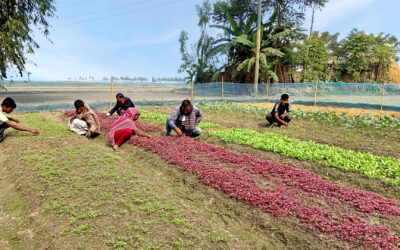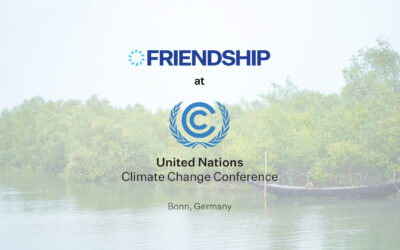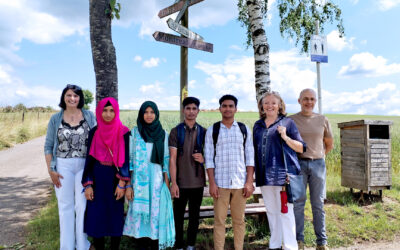Friendship Luxembourg lance une campagne de collecte de fonds pour la plantation d’arbres de mangrove au Bangladesh. Quatre euros = 1 arbre planté. Objectif : des milliers d’arbres pour renforcer la biodiversité et les écosystèmes protecteurs des populations vulnérables.
(English version below)
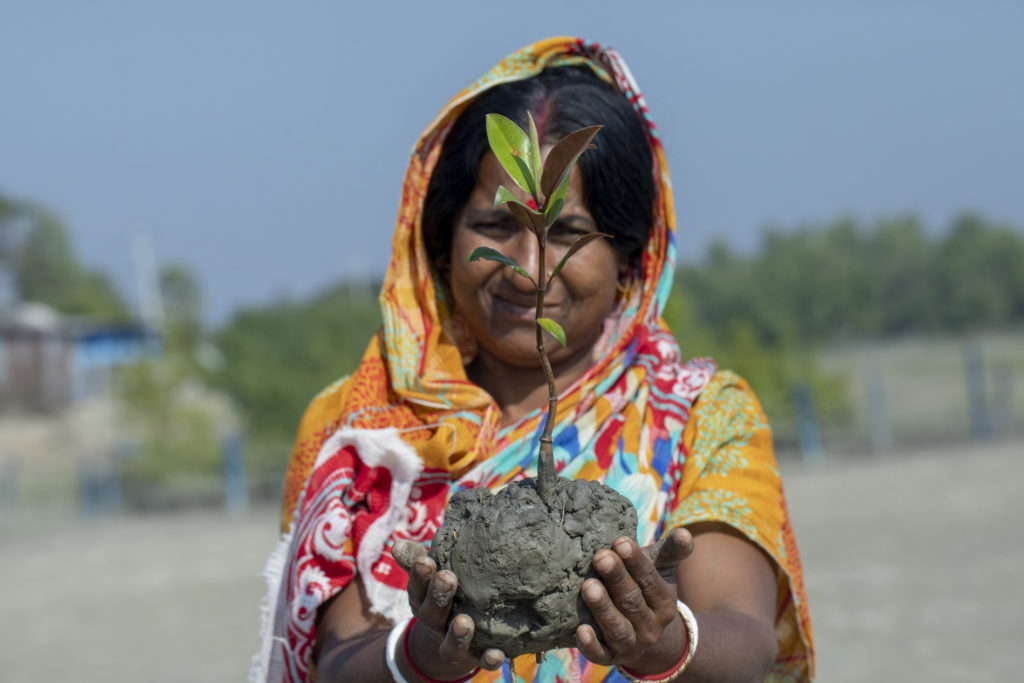
by Stéphane Van Haute
June 6, 2021
Le Bangladesh est un pays particulièrement vulnérable aux inondations, tempêtes tropicales et cyclones dont la fréquence et l’intensité augmentent à cause du réchauffement climatique. Dans la région côtière, les forêts de mangroves font office de barrières contre l’érosion côtière en atténuant l’effet des vagues sur les digues et en limitant l’intrusion de l’eau salée sur les terres fertiles. La plantation de mangroves est une mesure d’adaptation au changement climatique prioritaire au Bangladesh. De plus, les mangroves absorbent le CO2 plus rapidement que les autres forêts et stockent 3 à 5 fois plus de carbone par superficie équivalente que les forêts tropicales et 8 fois plus que nos forêts tempérées. Selon le GIEC, ce sont des écosystèmes de choix à protéger et restaurer. Les témoignages des habitants sur le terrain (à lire ici) illustrent bien la nécessité de ce type de projet pour plus de prospérité et de résilience face aux aléas climatiques.
Depuis 2017, Friendship a développé un vaste programme de plantation de mangroves dans des vasières situées entre les rivières et les digues, à proximité des Sundarbans, patrimoine mondial de l’UNESCO. Dans un pays densément peuplé comme le Bangladesh (165 millions d’habitants pour un territoire 4 fois plus petit que la France), il faut protéger activement les jeunes arbres contre la destruction pour garantir qu’ils arrivent à maturité tout en s’attaquant aux problèmes liés à la pauvreté qui pourrait acculer les riverains à endommager les zones plantées par nécessité (y mettre du bétail ou couper le bois). La plantation se fait donc de manière participative et inclusive, avec une attention particulière pour les femmes et les plus pauvres. Des gens qui ont planté les arbres eux-mêmes et connaissent l’importance de la mangrove sur leurs conditions de vie en prendront naturellement soin.
Le programme de Friendship prévoit aussi des formations pour augmenter les capacités des bénéficiaires à générer de nouveaux revenus (production agricole adaptée ou alternative avec des techniques plus appropriées) et une information sur les institutions et les services publics disponibles, tels que le filet de sécurité sociale. L’implication directe des fonctionnaires locaux permet de garantir qu’après la fin du projet, ils veilleront à la préservation de la forêt et resteront aussi attentifs aux besoins des populations et à leur vulnérabilité au changement climatique, notamment en ce qui concerne l’amélioration des infrastructures.
Suivant les recommandations des spécialistes locaux, il faut planter minimum 3000 arbres par hectare et, pour favoriser la biodiversité, au moins 5 espèces d’arbres différentes. L’approvisionnement en jeunes plants de mangroves étant parfois compliqué dans la région, Friendship a créé des pépinières, préparées par les communautés locales qui ont été formées à cet effet. Pour comprendre plus en détails comment fonctionne le reboisement des mangroves dans la baie du Bengale en tant que solution d’adaptation au changement climatique basée sur la nature, vous pouvez lire l’article paru dans le Dhaka Tribune écrit par le responsable Climate Action chez Friendship.
Le coût de la plantation et toutes les activités décrites ci-dessus s’élève à 4 € par arbre. Nous avons déjà planté plus de 100 ha, soit 300.000 arbres, et grâce à au soutien de nos partenaires Fondation Hellef fir d’Natur et Raiffeisen, ce sont 7 ha supplémentaires (21.000 arbres) qui seront plantés en 2021. À vous d’étendre l’envergure de cette reforestation ! Soutenez le mouvement pour le climat, donnez un arbre !
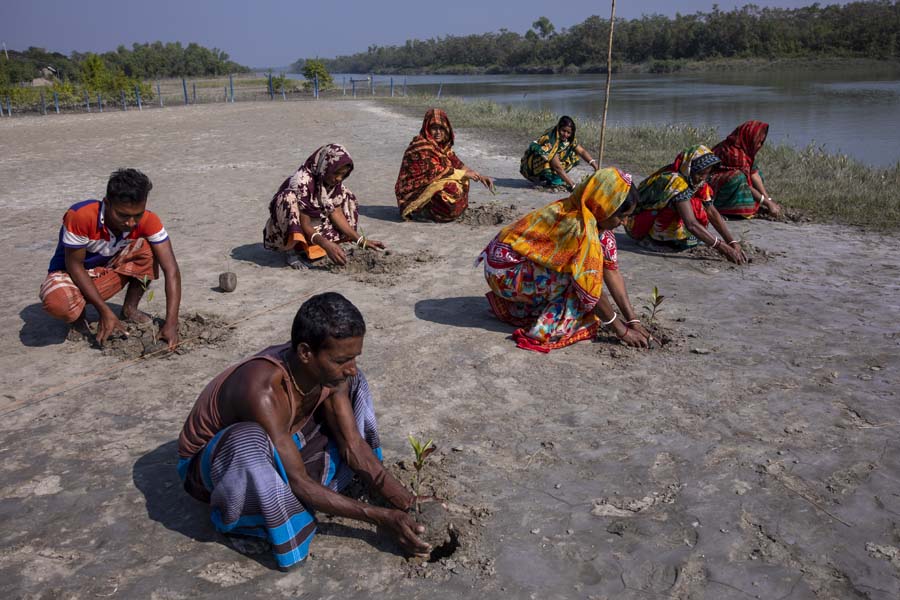
TREES FOR CLIMATE AND RESILIENCE
Friendship Luxembourg launches a fundraising campaign for the plantation of mangrove trees in Bangladesh. Four euros = 1 tree planted. Objective: thousands of trees to strengthen biodiversity and protective ecosystems for vulnerable populations.
Bangladesh is a country particularly vulnerable to floods, tropical storms and cyclones, which are increasing in frequency and intensity due to global warming. In the coastal region, mangrove forests act as barriers against coastal erosion by mitigating the effect of waves on embankments and limiting the intrusion of salt water on fertile land. Mangrove plantation is a priority climate change adaptation measure in Bangladesh. Moreover, mangroves absorb CO2 faster than other forests and store 3 to 5 times more carbon per equivalent area than tropical forests and 8 times more than temperate forests. According to the IPCC, these are prime ecosystems to protect and restore. The testimonies of the inhabitants in the field (read here) illustrate well the need for this type of project for more prosperity and resilience in the face of climate hazards.
Since 2017, Friendship has developed a large mangrove plantation programme in mudflats located between rivers and embankments, near the Sundarbans, a UNESCO World Heritage Site. In a densely populated country like Bangladesh (165 million inhabitants for a territory 4 times smaller than France), young trees must be actively protected from destruction to ensure that they reach maturity, while at the same time tackling the problems linked to poverty, which could lead local people to plunder the planted areas out of necessity (by putting livestock there or cutting wood). Planting is therefore done in a participatory and inclusive way, with a special focus on women and the poorest. People who have planted the trees themselves and know the importance of the mangrove for their living conditions will naturally take care of them.
The Friendship programme also provides training to increase the capacity of beneficiaries to generate new income (adapted or alternative agricultural production with more appropriate techniques) and information on available public institutions and services, such as the social safety net. The direct involvement of local officials ensures that after the project ends, they will ensure that the forest is preserved and that they will also remain careful to the needs of the people and their vulnerability to climate change, particularly with regard to infrastructure improvements.
Following the recommendations of local specialists, a minimum of 3,000 trees per hectare should be planted and, in order to promote biodiversity, at least 5 different tree species. As the supply of mangrove seedlings is sometimes difficult in the region, Friendship has created nurseries, prepared by local communities who have been trained to do so. To understand in more detail how mangrove reforestation in the Bay of Bengal works as a nature-based solution for climate change adaptation, you can read the article in the Dhaka Tribune written by Friendship’s Head of Climate Action.
The cost of planting and all the activities described above is 4€ per tree. We have already planted more than 100 hectares, corresponding to 300,000 trees, and thanks to the support of our partners Fondation Hellef fir d’Natur and Raiffeisen, another 7 hectares (21,000 trees) will be planted in 2021. It’s up to you to expand the scope of this reforestation! Support the climate movement, give a tree!

